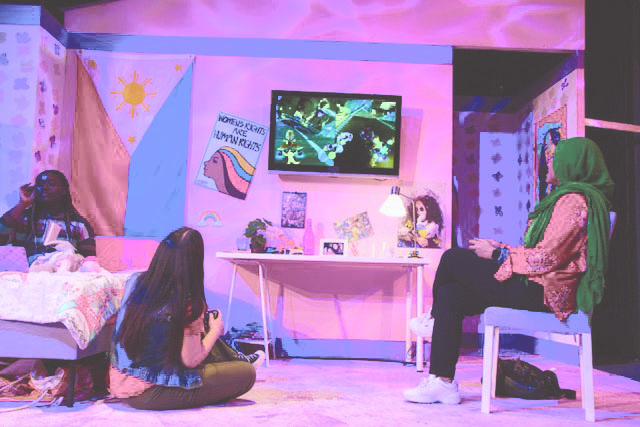UTD seeks to bring awareness to the polarizing discussion around social media through “#VOICED,” a multimedia play written by Janelle Gray and directed by Tinamarie Ivey that highlights struggles like parental pressure, racism, immigration, religion and mental health.
“#VOICED” focuses on the lives of six seniors that voice their concerns in the Lamont High School newspaper on recent mass shootings, immigration, religion and discrimination in a high school that systematically silences the voices of their students. The play focuses on the technological distribution of knowledge between students of this generation, symbolized with a stage that is plastered with screens containing text messages, video calls and social platforms.
“And even when [the high school students] were talking about some of the issues that they brought up, they were pointing to social media stories, so when I started creating ‘#VOICED,’ I thought there’s no way that you can really tell this story without social media, because that character of social media and of technology is actually what’s bringing them the stories,”Janelle Gray, the playwright of #Voiced and an instructor at UTD, said.
Before writing this play, Gray spoke with a group of high school students so she could get a picture of how social and political trends are affecting young people in the United States. The play features students from immigrant families, different races and different religions with the goal of including students from all backgrounds. For example, Charidan Matties, a junior visual and performing arts major, plays Seshi Garland, an overachiever who feels she must succumb to the expectations of her parents.
“I love how ‘#VOICED’ brings awareness to these issues, and it shows that you are not alone,” Matties said. “There are people out there that go through what you go through or can understand what you go through. And I truly believe that diversity doesn’t divide us, but it unifies us.”
Each one of the characters represents the life of a marginalized community that they channel in their school newspaper. The play emphasizes the importance of giving a platform to the voiceless, both through social media and through traditional press, primarily the school newspaper. In “#VOICED,” Anisa Hosseini, a senior visual and performing arts major, plays Ryan Adams, a biracial peacemaker who is torn between her two cultural identities after losing her Filipino mother. Hosseini said that she appreciates the ability to provide a platform for cultural diversity, an idea so critical to the content of the play.
“So just knowing that some of us have the privilege to be able to get up there and bring voice to the voiceless is very important,” Hosseini said. “It’s important for us to use that privilege and speak for those who cannot. So, I love that this is an aspect of the play and that is something that I really hope resonates with people, so that they can walk out of the theater and start thinking to themselves: who can I represent? Who can I speak for and who can I help?”

Ivey said that performances like “#VOICED” affirm the premise of theater as a universal language with a potential for social change.
“The arts and theater specifically present these opportunities that help us find the language that can begin these conversations from a place of respect, so more knowledge can be absorbed,” Ivey said. “And then we become people who are more compassionate, understanding and accepting of difference.”
Not only does “#VOICED” contribute to the discussion of change, it also reframes world problems that most people only see secondhand through the morning news.
“What I try to do in everything that I write is to humanize it, which is why I love characters,” Gray outlined. “I want to humanize whatever the issue is, because the point is that policy affects a human. It doesn’t just affect this general nebulous idea of people. It affects individuals in various ways. It’s very intentional that this play does not solve anything right now, but rather the intention is to start the conversation.”
“#VOICED” aired Feb. 16 to Feb. 18 and Feb. 23 to Feb. 25 at 7:30 p.m. at the UTD Theater.
Leave a Reply